 There is no doubt music has a big impact on how we think and feel. But can it be used to improve brain function and cognitive performance? We have explored this question with several posts on the Next Brain blog including one on the so-called Mozart effect. This effect claims that listening to Mozart’s music can increase your IQ.
There is no doubt music has a big impact on how we think and feel. But can it be used to improve brain function and cognitive performance? We have explored this question with several posts on the Next Brain blog including one on the so-called Mozart effect. This effect claims that listening to Mozart’s music can increase your IQ.
In an earlier post we found that there was some evidence that it can temporarily improve your spatial reasoning ability. Now the Science Daily reports on research from the University of Vienna that even dashes that hope. The study found that there is no evidence for the effect, not even a temporary improvement. It is important to note:
“Their comprehensive study of studies synthesizes the entirety of the scientific record on the topic. Retrieved for this systematic investigation were about 40 independent studies, published ones as well as a number of unpublished academic theses from the US and elsewhere, totaling more than 3000 participants.”
So this negative finding will likely stand. This of course does not mean that more active improvement techniques such as learning to play a musical instrument fail to boost cognitive performance.
Tai Chi is an ancient Chinese practice for linking mind and body in a martial art. Today it is a low-impact form of exercise and wellness that may improve a number of cognitive functions including mental focus, memory, managing emotions and perception.
Tai Chi involves a series of fluid, slow-paced motions and stretches that have been described as “meditation in motion”. The benefits of Tai Chi have just started to be formally studied. An in depth article on the Mayo Clinic website, Tai Chi: Discover the many possible health benefits, reports there is preliminary evidence for these benefits:
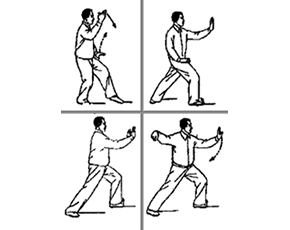 Reducing anxiety and depression
Reducing anxiety and depression- Improving balance, flexibility and muscle strength
- Reducing falls in older adults
- Improving sleep quality
- Lowering blood pressure
- Improving cardiovascular fitness in older adult
- Relieving chronic pain
- Increasing energy, endurance and agility
- Improving overall feelings of well-being
 Clearly these benefits go beyond improving brain function and cognitive performance. Getting started in Tai Chi is not hard. There are many fine resources available for little cost. You can produce results in as little as 8-12 weeks.
Clearly these benefits go beyond improving brain function and cognitive performance. Getting started in Tai Chi is not hard. There are many fine resources available for little cost. You can produce results in as little as 8-12 weeks.
Check out this 5 minute free video for a decent introduction. It won’t make you an expert but it should be enough to determine if you want to try more. There is a product pitch but it is soft.
I am interested in readers’ suggestions for resources for learning Tai Chi, especially those that emphasize improving brain function and cognitive performance.
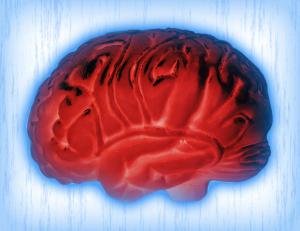 The role of yawing in cognitive performance is being rethought.
The role of yawing in cognitive performance is being rethought.
We yawn to cool our brains and crank up our mental alertness. Keeping the brain cool, like keeping a computer cool, is critical for efficient operation. In short, yawing will boost your cognitive performance not dull it.
The process works by moving blood into the brain.
For an excellent (and short) explanation of the new science of yawing and how to put it to use check out The 3-Second Energy Boost. I especially like the suggestions for how to bring on a yawn including thinking about one (they are contagious) and faking one.
The key for readers of the Next Brain Blog is that yawing is an important means of naturally maintaining mental efficiency. Don’t want to stifle that.
 A Psychology Today blog has an excellent post on the effective use of silence. It is a good reminder that just being quiet often gives the brain a chance to work well. Being silent can improve your listening skills, self control and even your attractiveness to others. The key is to know when to get into the quiet zone – for example, when you are angry or when someone else is speaking.
A Psychology Today blog has an excellent post on the effective use of silence. It is a good reminder that just being quiet often gives the brain a chance to work well. Being silent can improve your listening skills, self control and even your attractiveness to others. The key is to know when to get into the quiet zone – for example, when you are angry or when someone else is speaking.
When it comes to exercising the power of silence to achieve self-control the author writes:
“Think how much more in control you’d not only appear but actually be if your first response upon hearing or seeing something that sparks a strong reaction in you wasn’t to lash out emotionally but instead to become–silent. Silence is a terrific substitute for self-control, not only creating its appearance, but over time and with practice its substance as well.”
Although similar to the “count to 10 rule” for managing anger it is a bit different. The idea is to focus on being silent or learning to get into the quiet zone.
Interested to hear from readers that practice the power of silence and how it has helped them be more effective.
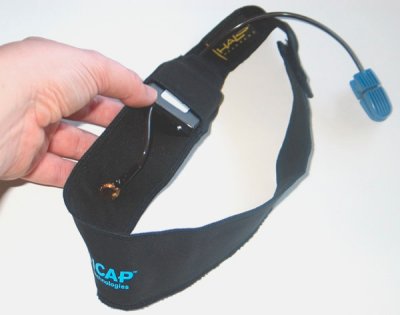 Neurofeedback is one of the most promising techniques we have for improving brain function and cognitive performance through systematic training. As we have discussed on the Next Brain Blog before:
Neurofeedback is one of the most promising techniques we have for improving brain function and cognitive performance through systematic training. As we have discussed on the Next Brain Blog before:
Neurofeedback training devices translate brainwaves into an external signal such sounds, graphs on a computer screen, movement of your computer’s cursor, action in a video game and even the motion of remote controlled toys.
Getting access to professional grade equipment can be very expensive. Consumer devices such as Neurosky’s headset or Emotiv’s EPOC (both of which I own) cost just a few hundred dollars but have limited functionality.
The market might be changing.
ICAP Technologies is offering the ICAP Release Meter, a professional grade neurofeedback system for $995. To get this price you need to use the coupon code available on the Mindware Forum. The Mindware Forum offers a good review of ICAP including a video interview.

Interested to hear from readers that have used the ICAP system or any at-home EEG-based neurofeedback training device.
 The state of the science conference sponsored by the National Institute of Heath on Preventing Alzheimer’s and Cognitive Decline is over. You can read an excellent recap in the LA Times or read a draft of the conference statement. For readers of the Next Brain Blog, a key finding is:
The state of the science conference sponsored by the National Institute of Heath on Preventing Alzheimer’s and Cognitive Decline is over. You can read an excellent recap in the LA Times or read a draft of the conference statement. For readers of the Next Brain Blog, a key finding is:
we have not done enough scientific research (large scale population based studies) to know what really works.
But the committee goes on to say:
“Some preliminary research suggests that a few prevention strategies could emerge as helpful, according to the report. These include programs that train people in memory, reasoning and speed of thinking as well as omega-3 fatty acid supplementation, physical activity and a diet low in saturated fat and high in fruits and vegetables.”
We have covered and will continue to cover all of these techniques.
 By consciously cultivating a sense of gratitude you can improve happiness by 25%. While this does not raise your IQ it definitely raises you emotional quotient or EQ by developing skills in recognizing and managing emotions.
By consciously cultivating a sense of gratitude you can improve happiness by 25%. While this does not raise your IQ it definitely raises you emotional quotient or EQ by developing skills in recognizing and managing emotions.
But how do you cultivate gratitude? For some excellent practical tips check out Enhance Happiness and Health by Cultivating Gratitude: Interview with Robert Emmons. Some examples:
“The most common method we use in our research is to ask people to keep a “Gratitude Journal” where you write something you feel grateful for. Doing so 4 times a week, for as little as 3 weeks, is often enough to create a meaningful difference in one’s level of happiness. Another exercise is to write a “Gratitude Letter” to a person who has exerted a positive influence on one’s life but whom we have not properly thanked in the past, and then to meet that person and read the letter to them face to face.”
I am interested to hear from readers that use specific techniques for building EQ through practicing gratitudes.
 The Alzheimer’s Association working in conjunction with the National Institute for Health has a established a website to keep citizens up to date on what the latest scientific evidence has to say by brain health. The site Maintain Your Brain, recommends eating a brain-healthy diet and staying physically, mentally and social active. Techniques we have covered elsewhere in the Next Brain Blog.
The Alzheimer’s Association working in conjunction with the National Institute for Health has a established a website to keep citizens up to date on what the latest scientific evidence has to say by brain health. The site Maintain Your Brain, recommends eating a brain-healthy diet and staying physically, mentally and social active. Techniques we have covered elsewhere in the Next Brain Blog.
Of special interest is the 70-page National Public Roadmap for Maintaining Cognitive Health (this a 2.5 MB file) and the Interactive Tour of the Brain. The tour is quick and easy but informative. It provides basic knowledge of the brain and Alzheimer’s disease.

A few minutes on the site provides strong motivation for considering the long-term health of your brain and what needs to be done today. To quote the site:
“When people think about staying fit, they generally think from the neck down. But the health of your brain plays a critical role in almost everything you do: thinking, feeling, remembering, working, and playing – even sleeping.”
Interested to hear from readers on what specific things they are doing to maintain brain health.
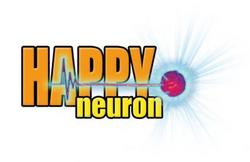 According to a recent press release, Happy Neuron, a brain training company has amassed a database of some 50 million training results. This is the biggest database of its kind and allows them to compare your cognitive training results to peers more precisely than anyone else on the market.
According to a recent press release, Happy Neuron, a brain training company has amassed a database of some 50 million training results. This is the biggest database of its kind and allows them to compare your cognitive training results to peers more precisely than anyone else on the market.
Happy Neuron uses games to train your brain. They have games for attention, language, memory, visual-spatial and executive function.
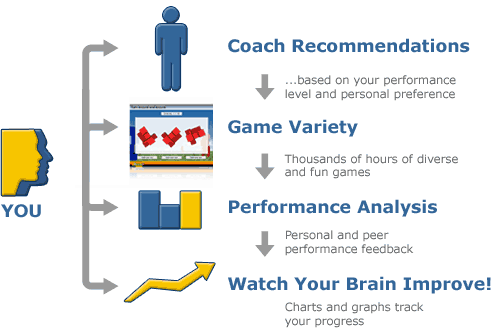
I am interested to hear from readers that use Happy Neuron’s products.
 Neurobics is a unique approach to brain training developed from the latest findings in neurobiology. According to one popular approach, Keeping Your Brain Alive, the core idea is this:
Neurobics is a unique approach to brain training developed from the latest findings in neurobiology. According to one popular approach, Keeping Your Brain Alive, the core idea is this:
“Neurobic exercises use your five physical senses and your emotional sense in unexpected ways and encourage you to shake up your everyday routines. Neurobics don’t require paper and pen or isolating yourself with puzzles. Everyday life is the Neurobic Brain gym. They can be done anywhere, anytime in offbeat, fun and easy ways while you’re getting up, commuting, working, eating, shopping or relaxing. They are designed to help the brain manufacture its own nutrients that strengthen, preserve and grow brain cells.”
Some examples:
- Take a different route when commuting to work this morning
- Brush your teeth with the other hand
- Use just the sense of touch when unlocking a door (don’t look at the lock)
- Move your waste basket at work
- Sit someone different at the dinner table tonight
Tiny changes with a significant and positive neurochemical impact. Any exercise can be Neurobic as long as it involves your senses in a new context, demands attention and breaks routine. This means we can design our own! The Keep Your Brain Alive Program was developed by Larry Katz a well-known Duke University Neurobiologist and includes 83 very specific things to try.
Interested to hear from readers that do Neurobics. What exercises do you do and how have you built them into your daily routine?
 There is no doubt music has a big impact on how we think and feel. But can it be used to improve brain function and cognitive performance? We have explored this question with several posts on the Next Brain blog including one on the so-called Mozart effect. This effect claims that listening to Mozart’s music can increase your IQ.
There is no doubt music has a big impact on how we think and feel. But can it be used to improve brain function and cognitive performance? We have explored this question with several posts on the Next Brain blog including one on the so-called Mozart effect. This effect claims that listening to Mozart’s music can increase your IQ.












